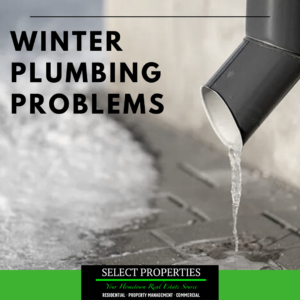
Nov 17, 2022
Winter brings major cold spells to many parts of the country, and frigid weather often puts your plumbing system at risk. When the mercury dips below 32 degrees Fahrenheit, uninsulated pipes can freeze and burst. Plus, those freezing temps mean your water heater is working extra hard to supply your home.
That’s why it’s crucial to prepare your plumbing system for the season.
“Some other common issues we see during winter are exterior faucets freezing, clogged drains due to increased use during the holidays, and frozen well pumps,” says Doyle James, president of Mr. Rooter Plumbing.
Let’s take a closer look at the winter plumbing issues that plague homeowners so you can be prepared before the holiday season. After all, the last thing you want is to have your holiday guests knocking on your neighbors’ door in the middle of the night to use their bathroom.
1. Leaks in the sprinkler or irrigation system
Homeowners should winterize their irrigation system before winter sets in.
A home’s irrigation system is a part of the system that delivers fresh water to the home, which means all plumbing pipes and fixtures are a part of this system. That includes your sprinklers and other irrigation equipment.
“This involves removing all the water that is contained in your irrigation piping,” says Travis Sewell, licensed plumber and field consultant for bluefrog Plumbing + Drain. “This precaution depressurizes your irrigation system, which lowers your risk of the irrigation system freezing to almost zero.”
2. Leaks in outdoor faucets or hose bibs
Hose bibs are the small taps on the outside of your home that are used to attach a garden hose for outdoor maintenance tasks. They are very likely to freeze and cause future damage if they’re not insulated properly.
“Cover every outdoor faucet with an insulated cover,” says Sewell. “Also, make sure you remove all hoses from your hose bibs.”
3. Lack of insulation on waterlines
Your exposed waterlines have a higher likelihood of freezing and bursting, so be sure to protect them.
“It is important to make sure all your waterlines are insulated, especially waterlines in areas of the home that lack insulation, like your garage and attic,” says Sewell.
Water heaters, water softeners, and water filtration systems are often located in uninsulated areas.
4. Frozen pipes that lead to pipe breaks
Are you about to experience several days of below-zero temperatures? Don’t let your pipes freeze.
“Water expands when it freezes and can break or burst a plumbing line,” says James. “The broken plumbing line can cause severe flooding in the home.”
During freezing weather, drip the faucets and open the cabinet doors to allow warm air to reach the pipes. A proactive solution to prevent frozen pipes is to use heat trace cables, which are wires that are powered by electricity and wrapped around waterlines.
“This system is normally installed on your main water service line where it enters the structure,” says Sewell.
5. Frozen well pumps
In frigid weather, well pumps can freeze, keeping homes from receiving water.
“Place well pumps in well-insulated, heated areas to prevent freezing,” says James. “Add insulation around supply lines to further help reduce the chance of freezing of the lines.”
6. Clogged indoor and outdoor drains
Over the holiday season, you’ll likely be spending more time than ever cooking in the kitchen. Just be sure you’re not jeopardizing the effectiveness of your sink drain.
“Putting the wrong things down the kitchen sink can cause clogs to occur very quickly,” says James. “Some things you never want to put down garbage disposals are grease, eggshells, coffee grounds, and vegetable peels.“
James also advises running cold water down the disposal for about 30 seconds to flush food particles.
Your outdoor storm drains will also need some attention especially when there is snow or ice accumulation.
“Cleaning up debris from the yard, like leaves and small branches, will help prevent clogs in storm drains,” says James.

Leave a Reply